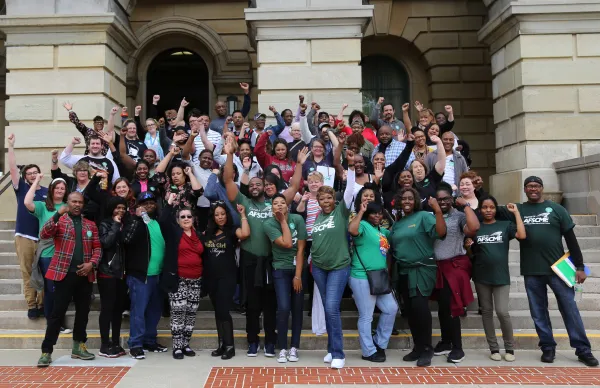DSP wage increase campaign set to kick into high gear

AFSCME members who care for individuals with developmental and intellectual disabilities in community agencies are ramping up for a wide-ranging, concerted effort to get wage increases through the state budgeting process.
These nonprofit agencies are almost entirely dependent on state government to fund their operations. For years now, AFSCME members have organized to lobby state lawmakers to pass appropriations that provide for much-needed wage increases. After a brief hiatus due to the pandemic, the campaign for fair wages for direct support professionals (DSPs) is about to kick into high gear once again this spring.
In Illinois, more than 27,000 people with intellectual or developmental disabilities live in community residences and rely on DSPs to assist them with daily tasks, from personal hygiene care to teaching essential life skills.
For many DSPs, the work is gratifying, but can be physically demanding and emotionally draining. On top of the challenging environment, low wages force some DSPs to look elsewhere for work—which hurts them and the people they care for.
Community disability agencies are woefully understaffed. Veronica Lea, an independent living coach at Trinity Services in New Lenox and the secretary-treasurer of AFSCME Local 2690, said that recently she and her colleagues have had to work double shifts, sometimes seven days in a row, just to make sure the people they care for have their needs met.
“We basically live where we work,” Lea said. “We go with our residents to doctors’ appointments, help them shower, run learning programs, take them on outings. We do that on a daily basis. Sometimes we’re so short-staffed that you have one person doing all that, taking care of six or seven people.”
AFSCME is planning meetings with legislators in their districts and a DSP Lobby Day at the State Capitol this spring where DSPs can meet face-to-face with their legislators to educate them on why it’s in the state’s best interest to give them the wage increases they deserve.
Over the past five budget cycles, Illinois has increased funding for community disability services by 52%. Because of AFSCME’s efforts, DSPs and other frontline employees at these state-funded agencies have seen their wages go up an average of more than $5 per hour.
But starting wages remain barely above minimum wage in many agencies, turnover is often 50% or more and vacancies are staggeringly high. And even when the state provides funding for DSP wage increases, it has not always required community agencies to pass the wage increases through to workers.
Last year, AFSCME advocated for a $3.50 an hour increase for frontline personnel to meet the Guidehouse study recommendations commissioned by the state in 2018. In the end, the budget included a $1 hourly increase—not as high as it should be, but AFSCME secured legislative language ensuring the amount goes toward base wages.
“These jobs are incredibly difficult and our members care so much about the individuals they care for,” said Maggie Lyons, Council 31’s strategic campaign coordinator. “We’ve fought for and won increases in the past, but it’s not enough. DSPs deserve more.”
